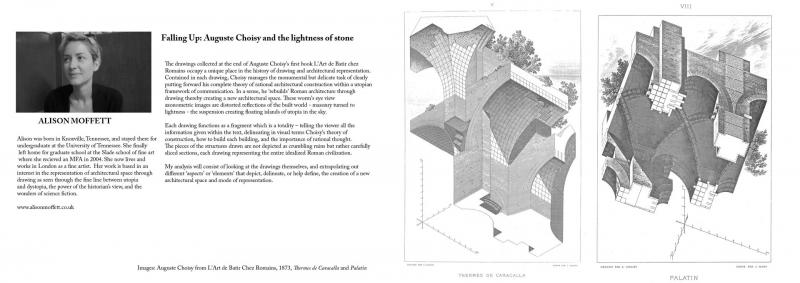The 12-month programme in History and Critical Thinking provides a platform for critical enquiry into theoretical debates and forms of architectural and urban practice. The aim is three-fold: to connect contemporary arguments and projects with a wider historical, cultural and political context; to produce a knowledge which will relate to design and public cultures in architecture; and to inquire into new forms of knowledge, research and practice.
The organisation of the course around a number of lectures, seminars, writing sessions and debate series offers students a range of approaches to investigating the contemporary from a historical, theoretical and cross-disciplinary point of view and to expanding and reinterpreting disciplinary knowledge in a broad cultural arena.
Central to the course is an emphasis on writing as critical practice of thinking. Different forms of writing such as essays, reviews, short commentaries, publications and interviews allow students to engage with diverse forms of inquiry and articulate the various aspects of their study. This year conversations with writers, critics, journalists and editors and the International Conference on Writing and Critical Thinking in Architecture exposed the students to a diversity of perspectives and skills fostering the critical role of writing in architecture.
Another area of action concerns the programme’s involvement with the design work produced in the school. This happens through a series of workshops and seminars with Diploma units. The students are also active in juries and public discussions of design work.
A study trip to Como, Italy was combined with an intensive programme of seminars focused on the MA thesis research.
The course recruits a wide variety of students. This year students came from Australia, Japan, Israel, Italy, Peru, Thailand and the USA.
Not all students are trained architects, and some come from the humanities and fine arts, having developed a particular interest in issues of space, buildings, architectural writing and urban debates. The question of professional training underlies all of the courses and activities. Students might be using the programme as a necessary step towards doctoral research (mostly in the AA or American universities), as a way to reorient their professional development from the practice of architecture into other fields such as museum and gallery work, journalism, or other architecture- and art-related fields, or as a route to teaching in the field of architectural history, theory and design. Every year a small number of graduates, depending on academic excellence and ability, act as seminar tutors for the History and Theory Studies in the undergraduate school.
The programme invites a number of academics and practitioners from around the world to contribute to its activities during the year. Recent visiting lecturers include Stan Allen, Pier Vittorio Aureli, David Crowley, David Cunningham, Cynthia Davidson, Keller Easterling, Adrian Forty, Wendy Pullan, Michael Sheringham, Robert Somol, Anthony Vidler and Sarah Whiting.
Also a series of lectures and open seminars were organised around the theme of the annual History and Critical Thinking Debates, prompting a lively dialogue between students and the visiting speakers: Douglas Spencer (AA), Juan-Luis Valderrabano-Montañés (UPC – Barcelona), Pier Vittorio Aureli (AA / Berlage Institute), Wendy Pullan (University of Cambridge), Dubravka Sekulić (Belgrade / Jan van Eyck Academie), Monia de Marchi (AA), David Cunningham (University of Westminster).
